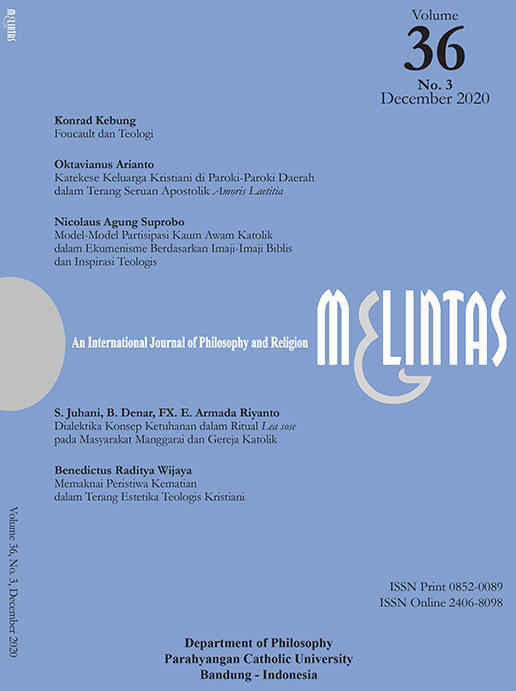Vol. 36 No. 3 (2020)

The word ‘theology’ seems to have provoked various reactions, ranging from inattention to suspicion. In the academy, that same word has often been forced to fit within the category of religion and is associated with unscientific matters and worse, irrational thoughts. Perhaps these are part of the consequences of seeing reason as the only way to understand reality. However, we can continue arguing about the term ‘understanding’ as well. Is theology about understanding? Or, is it about way of being (with) and of living (with)? Sometimes it is that with that creates a huge difference on our perspective. Regardless of our believe or not believe in God, theology is unavoidable as long as there is “the other” in our reality.
The articles in this edition of Melintas bring up various aspects of human relatedness with God philosophically and theologically. The first article presents the relation between Michel Foucault’s philosophical thoughts and theology, following the tendency that recently many poststructuralists and postmodern thinkers have been interested in this issue. One can find in his thoughts raw materials useful for theological reflections which are basically grounded on reality and the concrete life of humankind. The second article explores the roles of family members, the themes for catechesis, and the methods of Christian family catechesis to be used in rural area in Indonesia. Contextual catechesis is here referred to as a form of catechesis that takes into account the experiences of the faithful as a source of family catechesis in relation to the Scripture. The third article offers models of participation in ecumenism for the Catholic laity. Five models offered in this article are of faith conversation, friendship, sharing of spiritual wealth, dialogue of life, and familial visits. The fourth article aims to dialogue the concept of divinity in Manggarai, Indonesia, with the teachings of the Catholic Church. The approaches used by the authors of this article to trace the concept of divinity in the two contexts are mainly qualitative with ethnographic as well as documentation methods. The fifth article offers an interpretation that death is not seen as merely ‘death’ from the human perspective, but a passage towards a mystical and aesthetic point of view, which illustrates a sign of God’s calling to humans to enter the beauty and union with God.
Thinking about and living with “the other” through different areas of thought may enlarge as well as overlap our horizons, in a constructive way. Theology is not so much about absolutising religious doctrines as limitlessly correlating us with others and the Other as long as we live on this earth. Being rational does not have to mean being home alone. It is an ‘interstanding’.
H. Tedjoworo (Editor)

